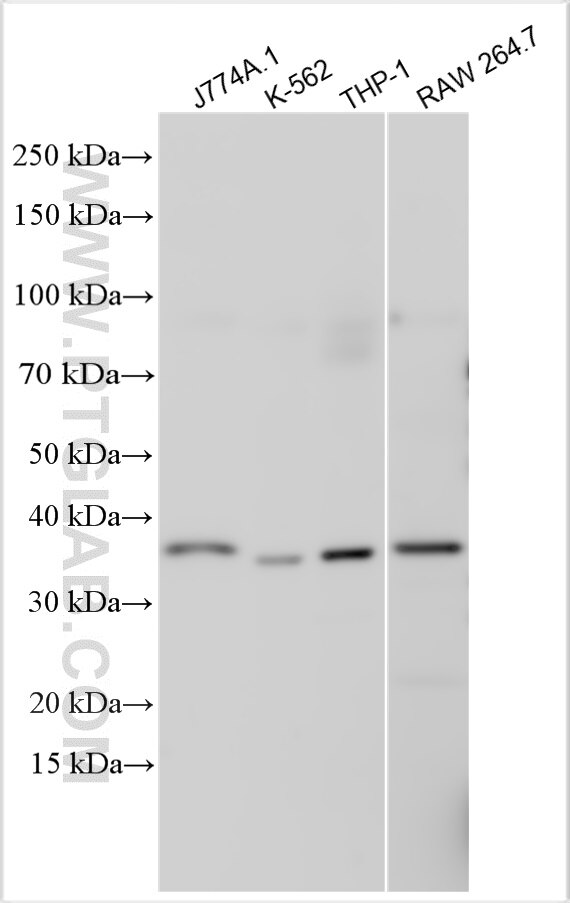Tested Applications
| Positive WB detected in | J774A.1 cells, K-562 cells, THP-1 cells, RAW 264.7 cells |
Recommended dilution
| Application | Dilution |
|---|---|
| Western Blot (WB) | WB : 1:500-1:1000 |
| It is recommended that this reagent should be titrated in each testing system to obtain optimal results. | |
| Sample-dependent, Check data in validation data gallery. | |
Product Information
18248-1-AP targets CLEC5A in WB, ELISA applications and shows reactivity with human, mouse samples.
| Tested Reactivity | human, mouse |
| Host / Isotype | Rabbit / IgG |
| Class | Polyclonal |
| Type | Antibody |
| Immunogen | CLEC5A fusion protein Ag13025 Predict reactive species |
| Full Name | C-type lectin domain family 5, member A |
| Calculated Molecular Weight | 188 aa, 22 kDa |
| Observed Molecular Weight | 36 kDa |
| GenBank Accession Number | BC112099 |
| Gene Symbol | CLEC5A |
| Gene ID (NCBI) | 23601 |
| Conjugate | Unconjugated |
| Form | Liquid |
| Purification Method | Antigen affinity purification |
| UNIPROT ID | Q9NY25 |
| Storage Buffer | PBS with 0.02% sodium azide and 50% glycerol , pH 7.3 |
| Storage Conditions | Store at -20°C. Stable for one year after shipment. Aliquoting is unnecessary for -20oC storage. 20ul sizes contain 0.1% BSA. |
Background Information
C-type lectin domain family 5 member A (CLEC5A, also known as CLECSF5 and MDL1) is a spleen tyrosine kinase (Syk)-coupled receptor abundantly expressed by monocytes, macrophages and neutrophils (PMID: 10449773). It has a pivotal function in activating multiple aspects of innate immunity against bacterial invasion (PMID: 28824166). Both in vitro and in vivo evidence supported that CLEC5A was involved in glioblastoma pathogenesis via regulation of PI3K/Akt pathway (PMID: 30834619). It appeared as a protein band of ~36 kDa because of glycosylation, while its predicted molecular weight is 22 kDa (PMID: 25877931; 19074552).
Protocols
| Product Specific Protocols | |
|---|---|
| WB protocol for CLEC5A antibody 18248-1-AP | Download protocol |
| Standard Protocols | |
|---|---|
| Click here to view our Standard Protocols |



